Thursday, October 31, 2024
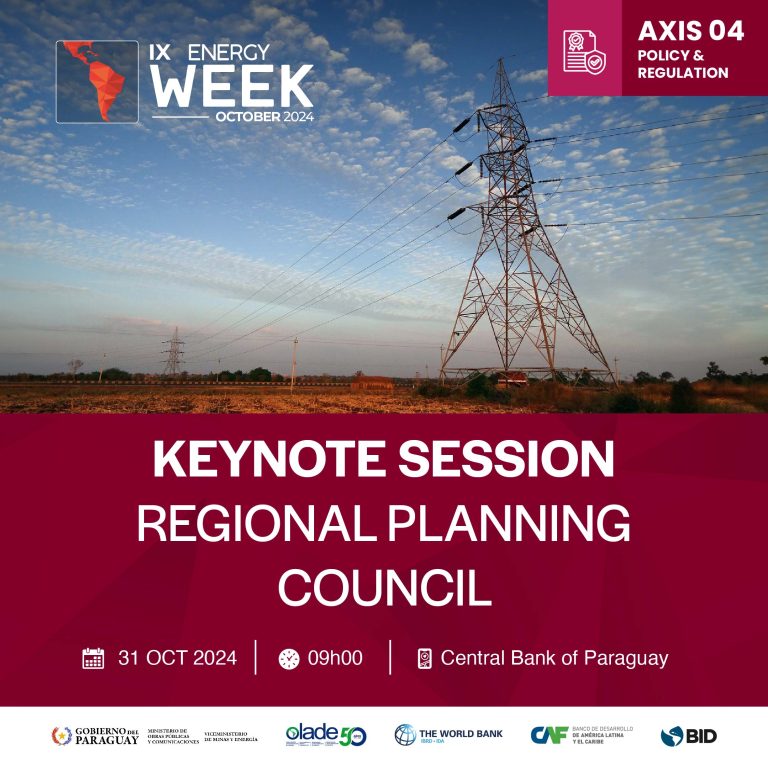
Keynote Session: Regional Planning Council
Time: 9:00 to 10:30
Building: Institute
Hall: Main Hall
Watch streaming YouTube
The aim is to discuss the establishment of a Regional Energy Planning Council for Latin America and the Caribbean, designed to promote the effective coordination and implementation of harmonized and sustainable energy policies in the region. The three cornerstones of the proposed council will be discussed: political consensus, technical support and access to sustainable financing. The panel will explore how this institutional framework can facilitate a just and inclusive energy transition in the region, addressing challenges such as infrastructure investment, regional integration and diversification of the energy matrix. The experiences and needs of member countries in relation to these three cornerstones will be discussed, seeking to identify strategies to overcome obstacles in the implementation of this initiative and maximize its benefits for sustainable energy development in the region.
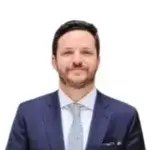
Guido Maiulini
Moderator
Advisory Head
OLADE
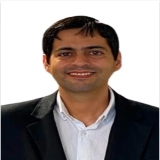
Thiago Prado
President
EPE

Martin Abeles
Director of the Natural Resources Division
ECLAC

Cristina Lobillo
Director of Energy Policy
European Community

Carlos Adrián Correa Flórez
Managing Director
UPME

Ricardo Gorini
Head Renewable Energy Transition Roadmaps (REMAP)
IRENA
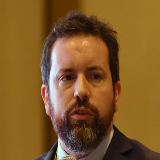
Facundo Deluchi
Advisor in Nuclear Security response and Technical Cooperation management
OIEA
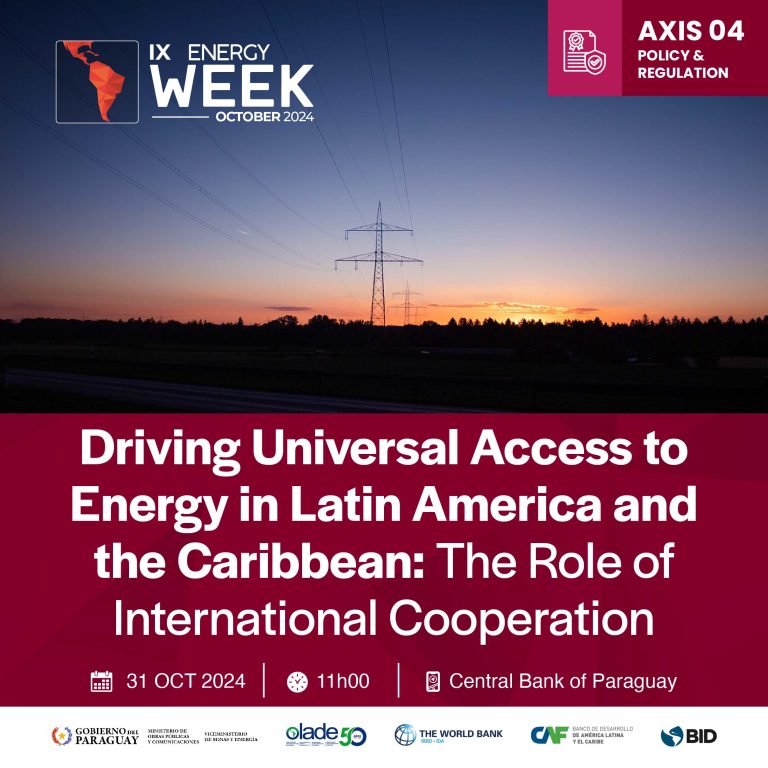
Boosting Universal Energy Access in Latin America and the Caribbean: the role of International Cooperation
Time:11:00 to 12:30
Building: Institute
Hall: Main Hall
This panel will explore the role of International Cooperation aimed at achieving universal access to energy in LAC. Synergies between the initiatives of the different players that are committed to and are members of the Universal Access Coalition for LAC will be presented. The progress of the regional study on energy access that serves as the basis for the work of the Universal Energy Access Coalition in LAC will also be disseminated.

Anabella Ruiz
Moderator
Program Coordinator
OLADE
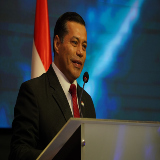
Felix Sosa
President
ANDE

Javier Cuervo
Energy Lead Specielist
BID
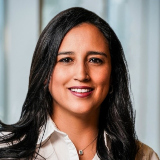
Isabel Beltrán
Vice President for LAC
GEAPP
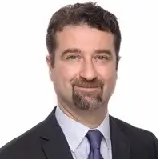
Gurbuz Gonul
Director, Country Engagement and Partnerships
IRENA

Gabriela Elizondo
Energy Practice Manager LAC - WB

Carlos Adrián Correa Flórez
Managing Director
UPME
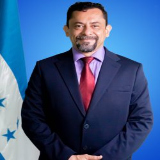
Wilfredo Flores
President
CRIE
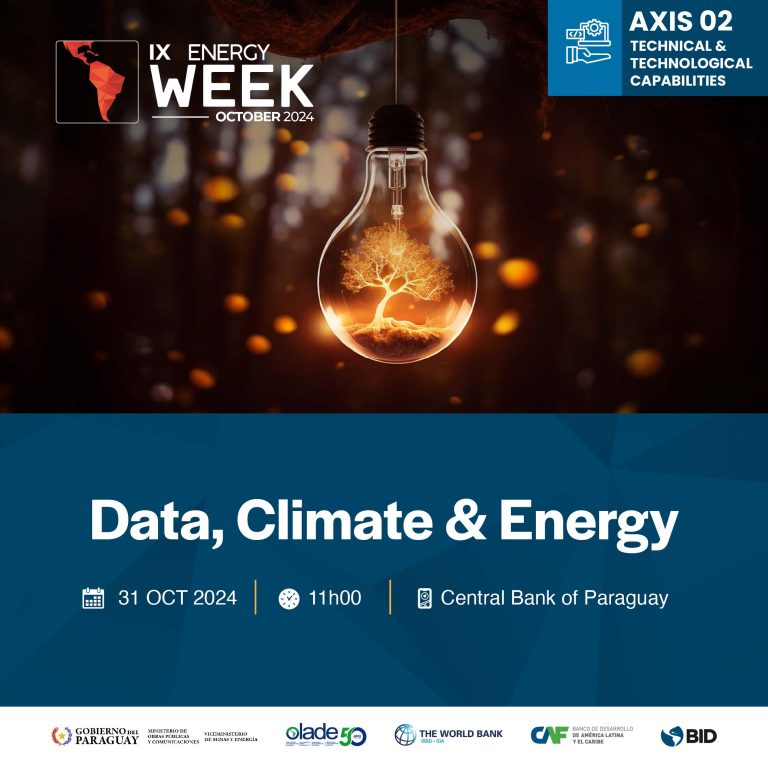
Data, Climate & Energy
Time:11:00 to 12:30
Building: Institute
Hall: Hall 1
The objective of this discussion table is to evaluate and propose strategies for effective interaction between regulators, statistical and meteorological agencies, planning bodies and companies in the energy sector in the transition to resilient and unified data infrastructures. How the adoption of cloud tools and platforms is transforming data management in the industry, enabling more strategic, real-time data-driven decision making, will be discussed. The session will address the need to develop a common data infrastructure that facilitates the integration of information for more efficient and secure joint planning. Likewise, the best practices of data governance, the reduction of transactional costs in the use of common platforms and the inclusion of key actors, such as meteorological organizations and the scientific-technical sector, in these new infrastructures will be analyzed. The goal is to identify opportunities to mitigate systemic and eventual risks in energy infrastructure through data integration.

Ivo Nacucchio
Data and Modeling Specialist
OLADE
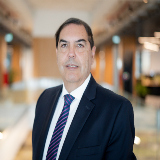
Juan Carlos Olmedo
President
National Electrical Coordinator
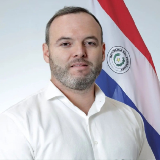
Rolando de Barros Barreto
Minister
MADES

Julian Baez Benitez
Regional Director
WMO Regional
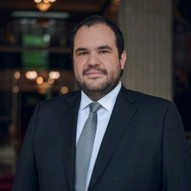
Nicolas Schubert
Public Policy and Government Relations Manager
Google

Sebastián Cepeda
Partner
E2BIZ

Sofia Maia
Head of Country Transition Research
Bloomberg NEF
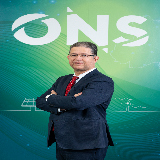
Christiano Vieira da Silva
Chief Operating Officer of ONS
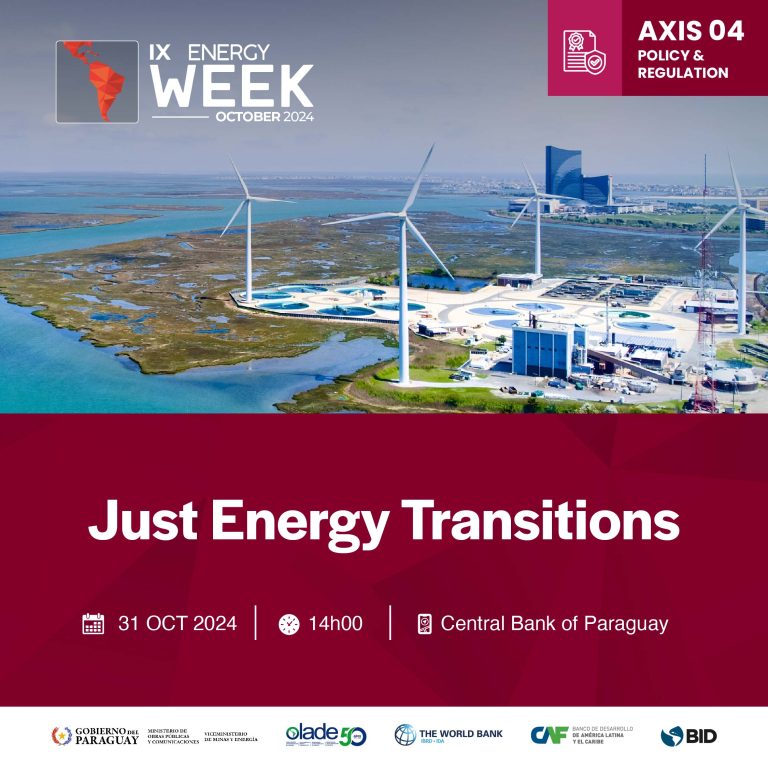
Just Energy Transitions
Time:16:00 to 17:30
Building: Institute
Hall: Main Hall
It aims to explore strategies to ensure fair and inclusive energy transitions, ensure access to clean and affordable energy, and promote quality jobs. Current challenges will be discussed, such as the fact that 2.3 billion people still cook with polluting methods, with a notable gap between urban and rural areas. In Latin America, 16 million people lack access to electricity, and 77 million to clean cooking systems, especially affecting rural areas and indigenous communities. The discussion will address how to improve the quality of electricity service, key to economic development and well-being. In addition, the creation of sustainable jobs in renewable energy and clean technology sectors will be discussed, with a focus on ensuring fair and accessible working conditions for women, youth and vulnerable communities. It seeks to promote a comprehensive approach that allows everyone, regardless of location or socioeconomic status, to benefit from a sustainable and equitable future. Collaboration between governments, the private sector and communities will be essential to achieving these goals.

Lucía Spinelli
Senior Energy Specialist
WB

Javier Cuervo
Lead Energy Specialist
IDB
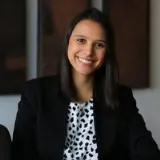
Alejandra Bernal
Latin America Programme Officer
IEA
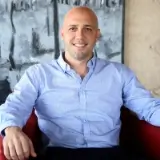
Blas Rozada Perret
Country Coordinator for Bolivia
Fonplata

Silvia Morimoto
Paraguay Representant
UNDP

Lían Allub
Senior Executive, Knowledge Management
CAF
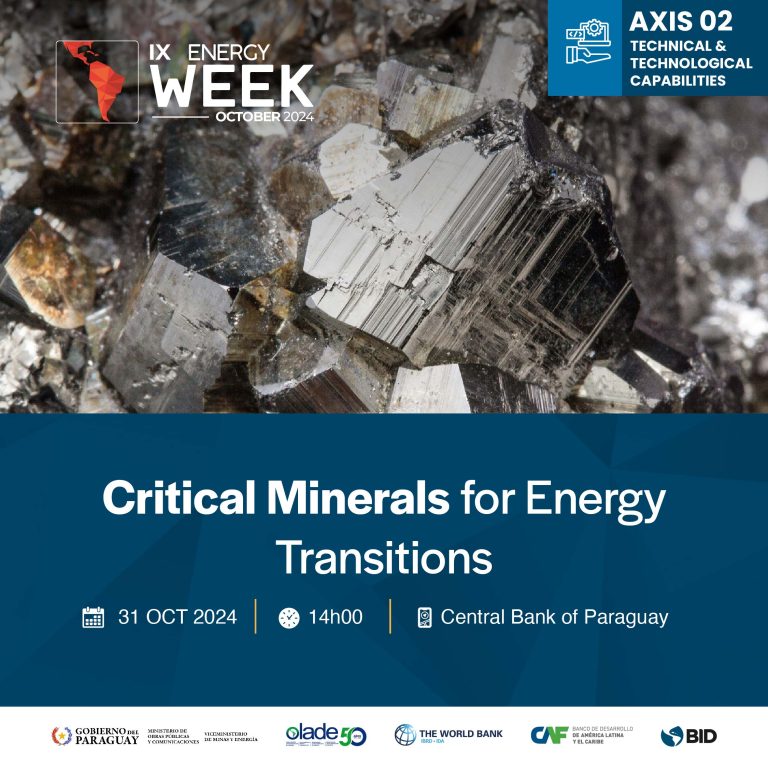
Critical Minerals for Energy Transitions
Time:11:00 to 12:30
Building: Institute
Hall: Hall 1
The objective of this discussion table is to examine the strategic role of Latin America and the Caribbean in the global supply of minerals critical for technological development and the energy transition. The privileged position of the region in terms of reserves of lithium, copper, nickel and other essential minerals will be analysed, as well as the opportunities and challenges this presents. The panel will seek to identify strategies for the sustainable and responsible development of these resources, exploring ways to maximize the economic and social benefits for the region, while addressing environmental concerns and promoting the creation of added value. The necessary regulatory frameworks, investments in research and development, and how the region can effectively position itself in the global value chain of clean technologies, thus contributing to its own sustainable development and the global energy transition will also be discussed.

Gaston Siroit
Advisor to the Executive Secretary
OLADE

Natacha Nunes da Cunha
Energy Lead Specielist
IDB

Javier Aguilar
Senior Mining Specialist
WB

Rafael Poveda
Senior Consultant
CEPAL

Nestor Bernal
Director of Mining
Vice Ministry of Energy - Paraguay
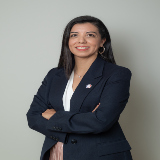
Lorena Chara
Director
AFD Agency in Argentina
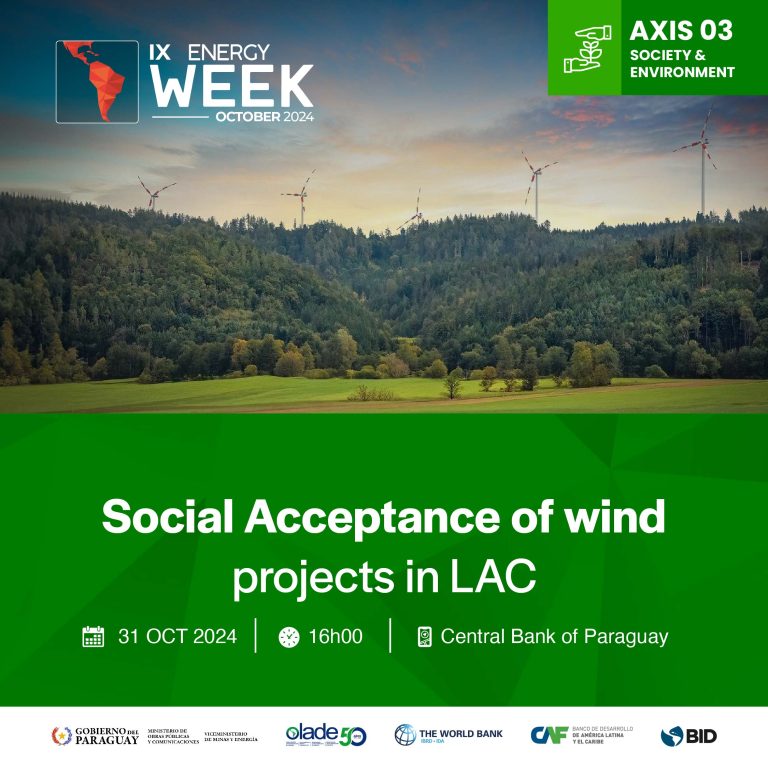
Social acceptance of wind projects in LAC
Time:16:00 to 17:30
Building: Institute
Hall: Main Hall
The panel aims to address the importance of social acceptance in the development of wind energy projects in Latin America and the Caribbean, considering their potential to diversify the energy matrix and promote a more sustainable future. The specific challenges of the region will be analyzed, such as the relationship with indigenous communities and their right to prior consultation, the impact on local economies based on agriculture or tourism, expectations for economic development and employment generation in rural areas, and the need to preserve biodiversity ecosystems. The discussion will focus on public perception of wind energy, concerns about impacts on the landscape and biodiversity, and community participation in project development. In addition, the regulatory frameworks necessary to balance community protection and the promotion of wind development will be examined. These considerations are applicable to all energy projects, and the conclusions of this dialogue may inform the management of other types of infrastructure projects. The importance of incorporating social acceptance from the conception of the projects and in all its phases will be highlighted to ensure their success and sustainability.

Ramon Fiestas
Moderator
Chairman LAC
GWEC

Alexandra Planas
Lead Energy Specialist
IDB
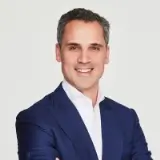
Rafael Solis Hernandez
Director of Public Affairs & Community Relation
EDP
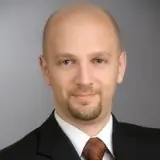
Fernando Cofman
Commercial Manager
IMSA
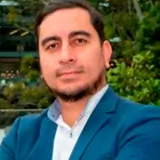
Carlos Correa Flórez
Managing Director
UPME
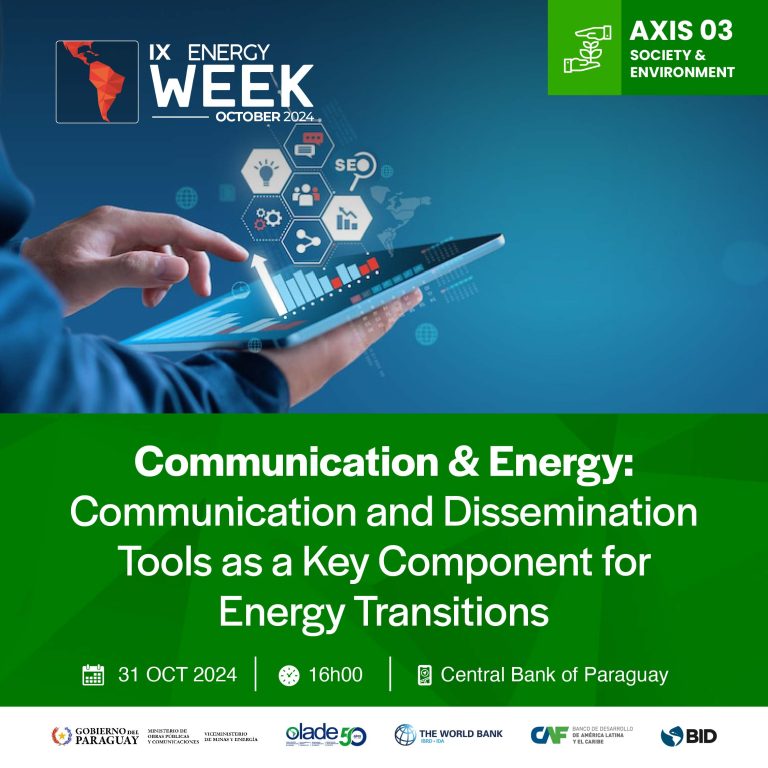
Communication & Energy: Communication and dissemination tools as a key component for energy transitions
Time:16:00 to 17:30
Building: Institute
Hall: Hall 1
The objective of this discussion table is to equip participants with the necessary tools and knowledge to become active agents of change in the field of energy transition. The energy transition, which involves a fundamental shift from fossil fuels to more sustainable and renewable sources, is crucial to addressing global climate challenges and promoting more sustainable economic development. Communication and dissemination play an essential role in this process, facilitating knowledge transfer, ensuring public acceptance and promoting innovative energy policies. The discussion will focus on the use of digital platforms, media campaigns and educational programmes to educate the population about the benefits of renewable energy and foster a positive attitude towards its adoption. In addition, it will explore how the dissemination of technical information and collaboration between experts can accelerate the implementation of new energy technologies, and how effective communication between policy makers and citizens is crucial for the formulation and acceptance of viable and socially accepted energy policies.
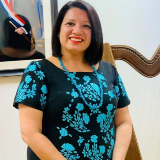
Liz Coronel
Director General
General Unit of Energy Resources of the Ministry of Foreign Affairs
Paraguay
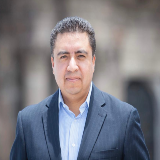
Xavier Basantes
Ecuador

Grace Keller
Chile

To be confirmed
Energy Group
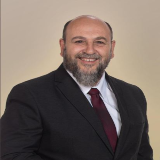
Luis Custodio
Editor
El País newspaper from Uruguay

Josefa Corral
Communication and Institutional Relations Advisor
OLADE

Cristian Najera
Head of Communication Unit
Secretary of Energy Honduras
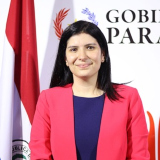
Ninoska Alonz
Vice Minister of Communication
MITIC Paraguay

